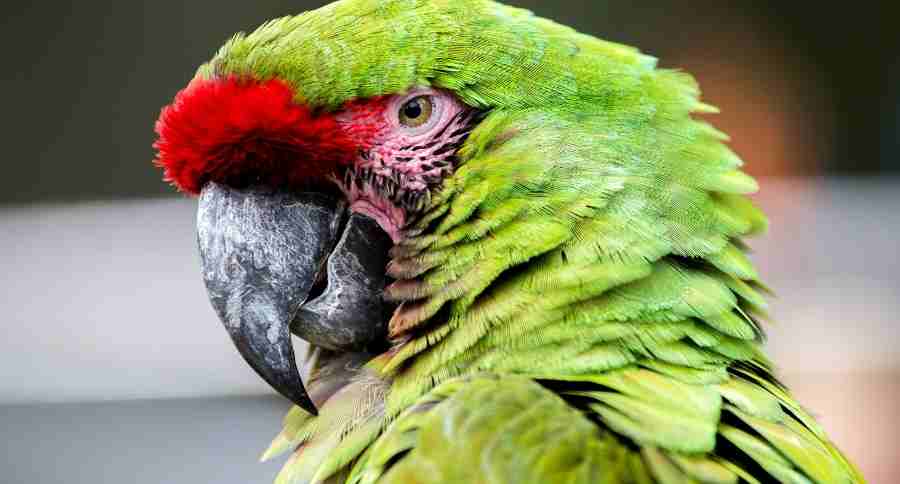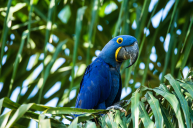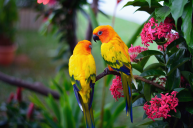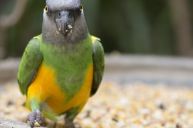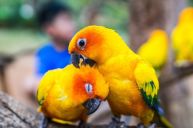One of the questions aviary experts get about military macaws is whether or not they can talk. In fact, they have a specialized voice box that allows them to imitate sounds, which especially helps those that live in the wild.
They can easily imitate human voices! Yet macaws are a very difficult pet to own, and they can live up to 50 to 60 years. 80 percent of these birds end up at a rescue or sanctuary, so this is a very serious decision and lifetime commitment in some cases.
Military macaws are such a beautiful bird. Here are some interesting facts from The Spruce Pets about this macaw:
- Military macaws are large parrots that have a reputation for being pleasant, even-tempered pet birds. These curious birds look forward to interacting with its human "flock."
- This macaw is not a pet that you can buy and ignore. These birds need interaction and mental stimulation. They're like any other pet and need human interaction!
- Owners should make sure that their pets are allowed a minimum of 2 to 4 hours of playtime outside of their cages every day.
Living with a macaw is a big commitment!
Are Macaws friendly? Will they bite?
https://www.instagram.com/p/B-VT-A7nYic/
Yes, of course, these birds are friendly! Yet when it comes to biting, experts tell us that they can bite but they don't do this for no reason. There are signals pet bird owners need to watch for certain signals.
Overall breed description and care
According to Pet Guide, the Military macaw is known for "blushing" and their white face will turn red!
The Military macaw is just slightly smaller than its cousins, with adults reaching an average length of 31 inches, and weighing up to 2.4 pounds.
- Macaws are playful and inquisitive and are able to mimic human vocalizations very well.
- Macaws are messy eaters. Their incredibly strong beaks are adapted for eating all sorts of nuts and seeds, as seen in their ability to crack open incredibly hard-shelled nuts with ease.
- Macaws are able to reach flying speeds of up to 56 kph (35 mph).
The Spruce Pets explains that the cage itself needs to be large! The cage should be at least 2.5-feet by 3-feet wide and 5-feet tall. If you can, create a dedicated bird-safe room or an aviary for your macaw.
Clean the perches and toys once a week, wash the floor of the cage once a month, and thoroughly sanitize the rest of the cage once a year.
These colors!
https://www.instagram.com/p/B-SdZI3lEil/
The Beauty of Birds explains these beautiful color patterns:
"The Military macaw's plumage is mostly green, except for the red tuft of feathers on the forehead (behind the cere of the beak), white cheek patches with tiny black feathers, bluish-red primary wing feathers, and tail feathers that are brown-red above and yellow underneath. The plumage of young birds is duller compared to the adults'."
Health issues
Feather plucking is always something to watch.
Macaws mae live a long time, but they are still prone to "macaw wasting syndrome," a viral infection, as well as overgrown beaks. Like other pet parrots, military macaws may resort to self-mutilation by feather plucking if they feel neglected or bored.
Some more cool facts about the Military macaw:
- It is native to forests of Mexico and South America and though considered vulnerable in the wild, it is still commonly found in the pet trade industry.
- The military macaw's name comes from the resemblance of their plumage to a military uniform. There are three subspecies (and common names) of Ara militaris, A. m. militaris, A. m. mexicana, and A. m. boliviana.
- A. m. militaris are found in areas of Bolivia, Peru, Ecuador, Colombia, and Venezuela. A. m. mexicana occupy areas in Mexico and A. m. boliviana live in Bolivia and Argentina.
- Given their green plumage, they greatly resemble great green macaws and are usually distinguished from great green macaws by their smaller size, completely black bill, and overall darker color.
- Military macaws live in large flocks and can live about 50-60 years in the wild. They can often be heard long before they are seen.
- They are a very noisy bird making a variety of loud cracking and shrieking sounds, including a loud kraa-aak.
- Military macaws will leave their roosts in flocks around dawn to forage.
Check out the term Ara militaris if you need to do additional research.
Have you ever lived with a parrot? Please leave us a comment below!
WATCH NOW: Budgerigars Are Little Birds!
https://rumble.com/embed/u7gve.cc4f25/
